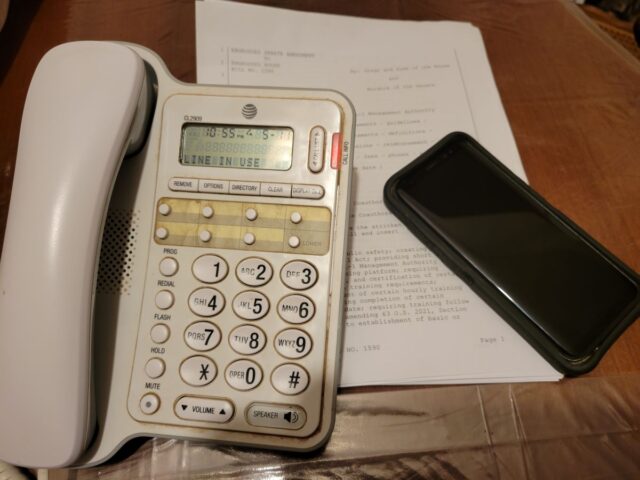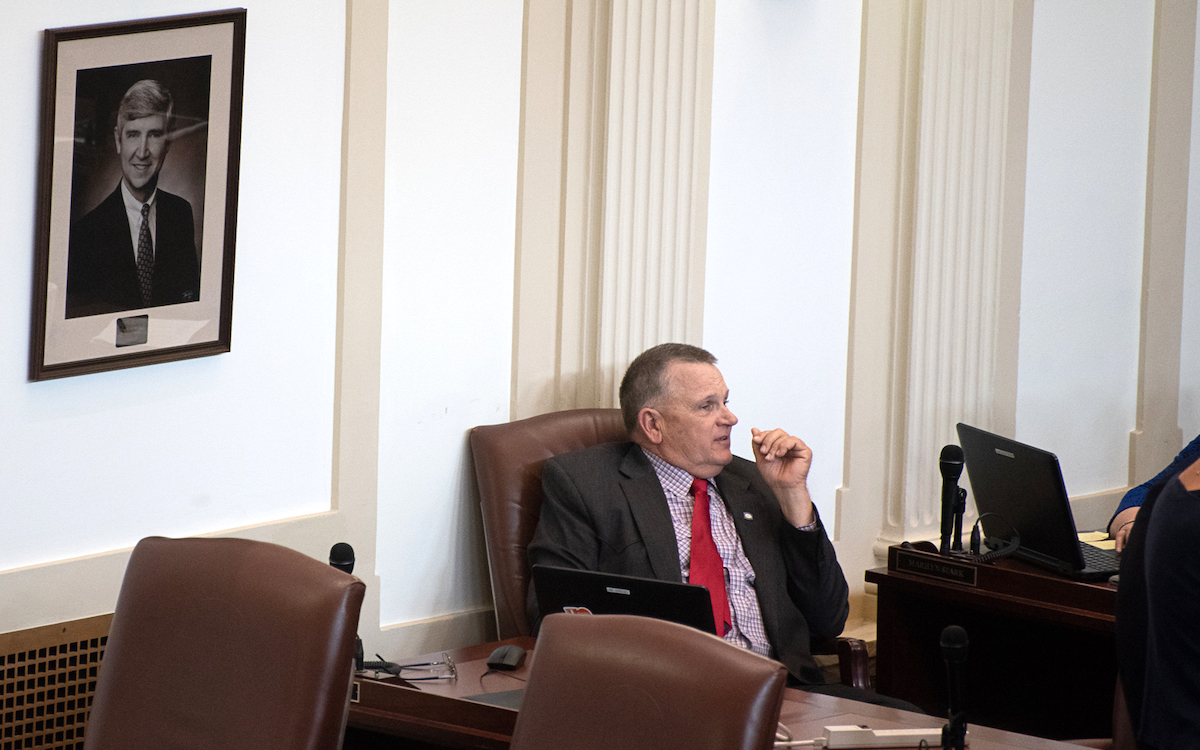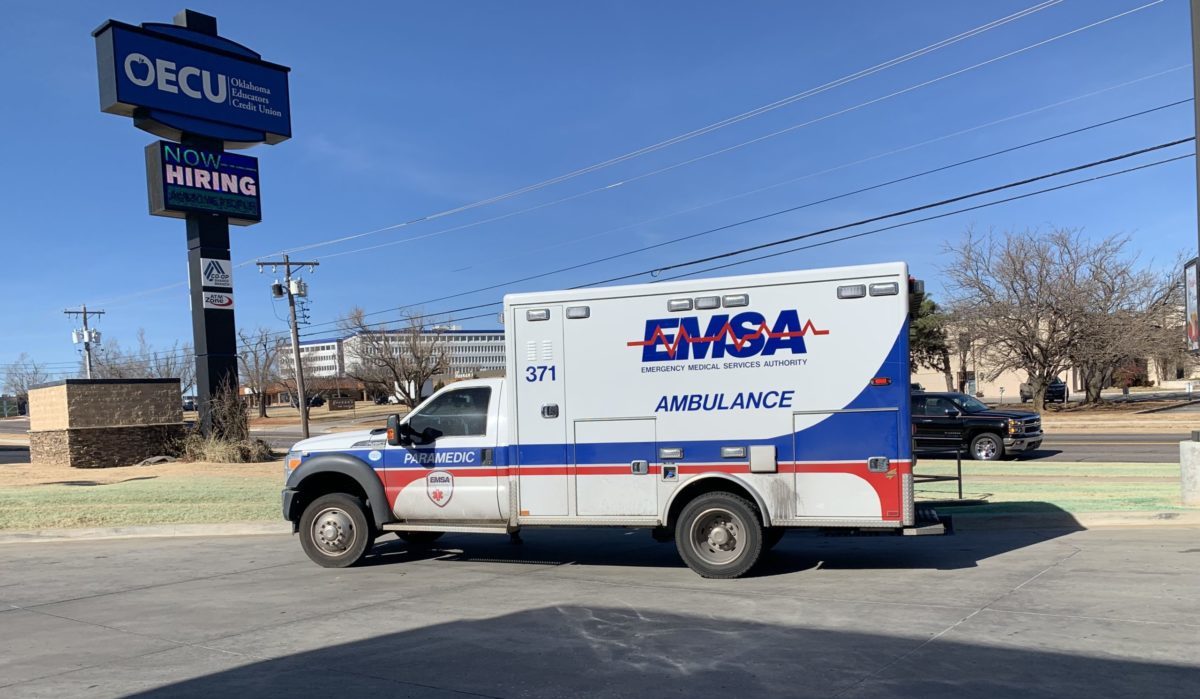

(Update: On Wednesday, May 17, Gov. Kevin Stitt signed HB 1590. The following article remains in its original form.)
As part of an effort to upgrade the state’s emergency hotline system, Oklahomans will see a permanent 67 percent increase in the monthly 911 fees that they pay on each cell phone line if Gov. Kevin Stitt signs a measure into law that cleared its final legislative hearing Thursday.
HB 1590 would raise the monthly fee on all devices with the ability to dial 911 from 75 cents a month to $1.25 per month. The fee for landlines, which varies depending on the carrier, also would be set at $1.25, which is lower than most companies charge currently.
Critics complain the 50-cent-per line hike would amount to a tax increase for virtually all Oklahomans. The fee is assessed on each mobile phone or device that can place calls to 911, as well as on each land line. It also is assessed on prepaid mobile phones.
Twenty-five years ago, most Oklahoma families had a maximum of two land lines. Families with a cell phone then were rare. Today, it’s common for families to have more than one cell phone, with many teens having their own phones and many families having tablets that can also be used to dial 911. As a result, land lines are decreasing.
Rep. Jim Grego, the author of HB 1590, said those with landlines would see a decrease in their 911 monthly fees. While HB 1590 puts the monthly fee for all cell phones, devices and land lines at $1.25 per month, some land line companies charge up to $4 a month, he said. Grego said the monthly 911 fee he pays for his landline is $1.75.
“Everybody knows eventually the land lines will be fewer and fewer,” he said.
HB 1590 would modernize Oklahoma’s 911 system, which was last updated in 1975, by advancing it from an analog to a digital system. The bill also would require mandatory telecommunicator CPR training for 911 operators in the state, improving their ability to assist callers until first responders arrive.
Grego (R-Wilburton) said the increase in cell phone fees is necessary to bring in the $8 million to $10 million a year that members of the Oklahoma 911 Management Authority told him it will cost to upgrade the state’s 911 system and to maintain it in the years ahead, while also providing money for the increased training of 911 dispatchers.
But a March fiscal analysis prepared on Grego’s committee substitute for HB 1590 estimates much higher revenues from the hike in 911 cell phone fees. Prepared by House of Representatives staff, the fiscal report includes an analysis by the Oklahoma Tax Commission showing the increase in 911 wireless fees would bring in an estimated $25.3 million in the 2025 fiscal year, the first full year of the increase. (The estimate shows it would bring in about $14.8 million after it became effective Nov. 1 during the 2024 fiscal year, which begins July 1.)
“I have not heard that [$25 million figure] from anybody,” Grego said. “I have not seen that study. I’d like to know what they based it on.”
‘Proud that it passed by the margin that it did’

Like Grego, other backers of HB 1590 say even though 911 has saved countless lives, it’s time to upgrade to Next Generation 911. Making the change would speed up response times, improve caller location services and better coordinate responses.
Opponents of HB 1590 agree that Oklahoma’s 911 service needs to be upgraded, but they say it is a public safety issue that should be funded from state coffers like other state services, such as education, roads and health care.
Grego said the 911 charge is a user fee and provides a stable source of revenue for the service. Revenue for the state has traditionally been cyclical, with lawmakers having to slash the state budget just seven years ago because of an economic downturn.
“Money is plentiful today, but where will it be two or three years from today?” Grego asked. “If we had a way the state would lock the money in and put it in an account and guarantee we would have the money for the next 10 years, then we never would have went this route.”
Stitt must act on the bill by Wednesday, May 17. If the governor signs HB 1590 or lets it become law without his signature, the new fees and requirements would take effect Nov. 1. If Stitt vetoes the bill, legislators could override his veto with two-thirds support in first the House and then the Senate.
HB 1590 won overwhelming legislative approval in each chamber. It first passed the House of Representatives in March, 68-22. Last month, the Senate added amendments and approved it, 47-1. The House accepted the amendments Thursday and passed the measure, 82-2.
If Stitt axes the phone fee hike, Grego said he would seek a veto override because HB 1590 will save lives by upgrading the state’s 911 system.
“I’m proud that it passed by the margin that it did, and I’m hopeful the governor will sign it and we’ll get this thing rolling,” he said.
Jamie Hastings serves as the senior vice president of external and state affairs for CTIA, which advocates on behalf of America’s wireless industry for legislative and regulatory policies. She said the wireless industry values collaboration with its public safety partners to provide communities with reliable emergency services networks and to facilitate the transition to Next Generation 911.
“We are committed to ensuring Oklahomans and emergency responders can benefit from NG911 services,” Hastings said in a statement.
But Hastings also said questions remain about how the funds will be used to upgrade Oklahoma’s 911 system and why the costs will continue in perpetuity.
“We are concerned that increasing the taxpayer burden without accountability for how funds will be used — as HB 1590 would do — would not be the best path forward for emergency communications services in Oklahoma,” she said.
The Oklahoma 911 Management Authority manages the distribution of all 911 telephone fees. It has a governing board, which oversees the development and regulation of 911 systems in the state and hires a statewide coordinator. HB 1590 would make modifications to board membership and obligations of the agency.
Ambulance drivers struggle with outdated maps

HB 1590 is named for Haiden Fleming, a 22-year-old from the Locust Grove area, who died from a cardiac incident after eating lunch. His family lived close to a county line, which caused problems for 911 and emergency responders to locate him.
Fleming was a former student of Sen. Blake Stephens (R-Tahlequah), who is a co-author of the bill. Sen. Casey Murdock (R-Felt) is the bill’s principal author in the Senate.
“I don’t think many Oklahomans realize that our current 911 system is still using technology from 40 years ago,” Murdock said in a press release. “It’s even more challenging in rural counties that sometimes have to piggyback off one another to answer calls. HB 1590 would enable us to move to Next Generation 911, by giving us the ability to create and maintain the infrastructure we need to move analog to digital technology. This will decrease response times, better identify caller locations and better coordinate responses.”
The measure was drafted after Grego held an interim study on the matter three years ago.
“We heard in that study from several constituents whose children faced life-threatening situations while 911 calls were rerouted through different dispatch centers, and ambulance drivers struggled with navigating using outdated maps,” Grego said in the press release. “The same thing happened in the case of the young man for whom this bill is named. Updating our system will save lives.”
Grego said the issue is a particular concern in rural areas or where someone who lives too close to a county line may face time delays because 911 calls are sent to different call centers while the system tries to locate their address.
“This upgrade will ensure pinpoint accuracy so no matter where someone lives, 911 will know exactly where that person is and get them the assistance they need. That’s what this Next Generation is about,” Grego said in an interview. “When you call 911, it will immediately know where you are and then it will immediately route you to the right call center.”
Many people, mostly in rural areas, find it necessary to have land lines in the event they have an emergency, Grego said. Because of the Next Generation 911’s pinpoint accuracy, many people, including himself, likely will cancel their landlines after the new system is up and running.
“When you call, they will be able to find you almost immediately,” he said. “Sometimes they’re just not able to really locate you under their current system.”
In addition to infrastructure and computer upgrades, HB 1590 would require mandatory CPR training for emergency telecommunicators and would equalize fees charged for the service it would be uniform across the state. Grego said he is hopeful the updated fee structure would allow some communities to hire more dispatchers to help with emergency calls.
HB 1590 would require emergency telecommunicators who provide dispatch service for emergency medical services to complete by July 1, 2024, a 40-hour state-recognized training course for basic call handling and dispatch services. Any new emergency telecommunicator hired after Jan. 1 would be required to complete a 40-hour state-recognized training course within six months of being hired.
By July 1, 2024, emergency telecommunicators who provide dispatch services for emergency medical services would be required to complete a nationally recognized telecommunicator CPR training course. The training would follow evidence-based guidelines for high-quality telecommunicator CPR, which incorporates recognition protocols for out-of-hospital cardiac events.




















